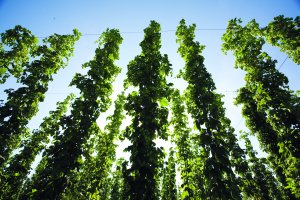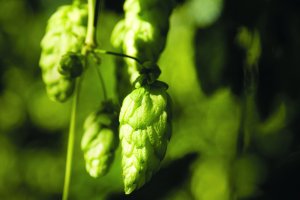This just in from Oregon’s ever-growing beer biz: Portland-based startup Indie Hops will donate $1 million to Oregon State University to launch a new breeding program for aroma hops grown in the Willamette Valley. Add that donation to a second million-dollar Indie Hops investment to develop the first hop pellet mill in the Valley along with cold storage and distribution facilities, and you’ve got a new company that could give craft brewers the stability — and respect — that they deserve.
It is fitting that the only U.S. hop merchant dedicated entirely to aroma hops for craft breweries is based in Oregon. Oregonians have been growing first-rate hops and brewing excellent beer since statehood, but for reasons involving the corporate dominance of the Anheuser-Busch InBevs of the world, hops and beer have remained surprisingly disconnected here. Hops are grown in the Valley but processed in Yakima, Wash., where they are sold as commodities, with unpredictable and occasionally maddening price swings. The 18-month-old Indie Hops aims to improve on that inefficient system by purchasing quality hops from Valley farmers, processing them into pellets at a newly completed mill between Hubbard and Mount Angel, and selling them to brewers all over the West Coast. The mill will employ just a few people to start, but if the new local supply catches on there is huge potential for growth.
Indie Hops’ co-founders are Roger Worthington and Jim Solberg, high school football buddies from Corvallis who decided to take the start-up plunge over the course of an evening sampling the wares at the Hopworks Urban Brewery in Portland. Worthington was a successful asbestos litigation attorney who was looking for a worthwhile and fun investment. Solberg was a 16-year Nike veteran who quit his job to sail the Pacific Coast in a craft he built himself and help out with a variety of start-ups including Nutcase Helmets and Hammersurf.
This just in from Oregon’s ever-growing beer biz: Portland-based startup Indie Hops will donate $1 million to Oregon State University to launch a new breeding program for aroma hops grown in the Willamette Valley. Add that donation to a second million-dollar Indie Hops investment to develop the first hop pellet mill in the Valley along with cold storage and distribution facilities, and you’ve got a new company that could give craft brewers the stability — and respect — that they deserve.
 It is fitting that the only U.S. hop merchant dedicated entirely to aroma hops for craft breweries is based in Oregon. Oregonians have been growing first-rate hops and brewing excellent beer since statehood, but for reasons involving the corporate dominance of the Anheuser-Busch InBevs of the world, hops and beer have remained surprisingly disconnected here. Hops are grown in the Valley but processed in Yakima, Wash., where they are sold as commodities, with unpredictable and occasionally maddening price swings. The 18-month-old Indie Hops aims to improve on that inefficient system by purchasing quality hops from Valley farmers, processing them into pellets at a newly completed mill between Hubbard and Mount Angel, and selling them to brewers all over the West Coast. The mill will employ just a few people to start, but if the new local supply catches on there is huge potential for growth.
It is fitting that the only U.S. hop merchant dedicated entirely to aroma hops for craft breweries is based in Oregon. Oregonians have been growing first-rate hops and brewing excellent beer since statehood, but for reasons involving the corporate dominance of the Anheuser-Busch InBevs of the world, hops and beer have remained surprisingly disconnected here. Hops are grown in the Valley but processed in Yakima, Wash., where they are sold as commodities, with unpredictable and occasionally maddening price swings. The 18-month-old Indie Hops aims to improve on that inefficient system by purchasing quality hops from Valley farmers, processing them into pellets at a newly completed mill between Hubbard and Mount Angel, and selling them to brewers all over the West Coast. The mill will employ just a few people to start, but if the new local supply catches on there is huge potential for growth.
Indie Hops’ co-founders are Roger Worthington and Jim Solberg, high school football buddies from Corvallis who decided to take the start-up plunge over the course of an evening sampling the wares at the Hopworks Urban Brewery in Portland. Worthington was a successful asbestos litigation attorney who was looking for a worthwhile and fun investment. Solberg was a 16-year Nike veteran who quit his job to sail the Pacific Coast in a craft he built himself and help out with a variety of start-ups including Nutcase Helmets and Hammersurf.
“We’re both craft beer enthusiasts and we both love the Willamette Valley,” Solberg told me in a telephone interview. “And we’re very bullish on the future of the craft brewing industry. We feel that it’s reached the point where it warrants a breeding program specifically focused on it. The more the hops industry gets focused on the Yakima Valley and the macrobrewers, the less attention the craft brewers get. The aroma hop varieties that the craft brewers prize are the ones grown in the Willamette Valley. The Oregon brewers love these hops but they are limited because the infrastructure is all up in Washington State. So they do their best to get Oregon hops via Yakima. But they’re not always even sure that’s what they’re getting.”
Solberg and Worthington intend to change that dynamic for the better. They have established relationships with Coleman Farms and Goschie Farms, purchased a supply of hops from the 2009 harvest along with hundreds of thousands of dollars of equipment for the new pellet facility and starting building relationships with brewers, crop scientists and suppliers. They’re planning to test out their new facility in the first week in March, and Solberg is confident that over time, Indie Hops will bring stability to a market that’s been maddeningly unpredictable for the past few years.
“The brewers don’t like volatility,” he says. “They like a fair price that’s sustainable. So we’re going to provide that. We’re going to price more like a consumer products company rather than a floating commodities market thing. Our promise to the brewers is that price isn’t going to change much other than small inflationary moves.”
 Solberg says he’s lined up major brewers from up and down the West Coast as potential customers, but he can’t offer any names yet for fear of burning bridges. He has been running the sales side of the business out of his Portland home. He climbed as high as vice president of international apparel at Nike, so you can assume he’s probably got some marketing chops. It helps that he’s selling a solution in addition to a product.
Solberg says he’s lined up major brewers from up and down the West Coast as potential customers, but he can’t offer any names yet for fear of burning bridges. He has been running the sales side of the business out of his Portland home. He climbed as high as vice president of international apparel at Nike, so you can assume he’s probably got some marketing chops. It helps that he’s selling a solution in addition to a product.
“We can bring something to the craft brewers that gives them a real advantage,” he says. “We can also stabilize some things for the Oregon hop farmers.”
Solberg recognizes that success will take time and is far from guaranteed. Craft brewers are unlikely to jump to a new supplier overnight, and it could take OSU’s crop scientists eight to 10 years to come up with a quality, disease-free new variety of aroma hops. But he believes that the Indie Hops strategy makes sense, and the timing is good.
“We’re not gonna get rich doing this by any means,” Solberg says, laughing. “But I think it’s something that can pay for itself, and eventually become a nice little business.”
Ben Jacklet is managing editor of Oregon Business.


